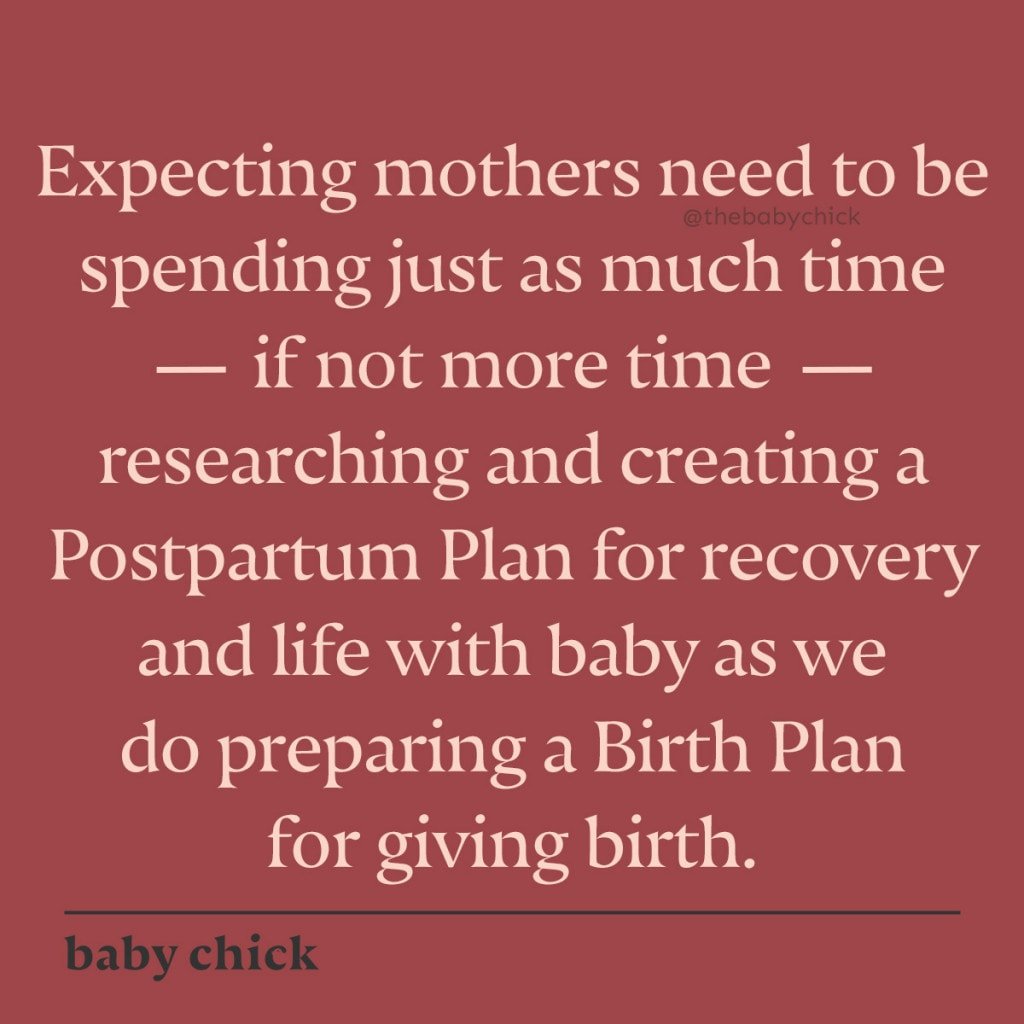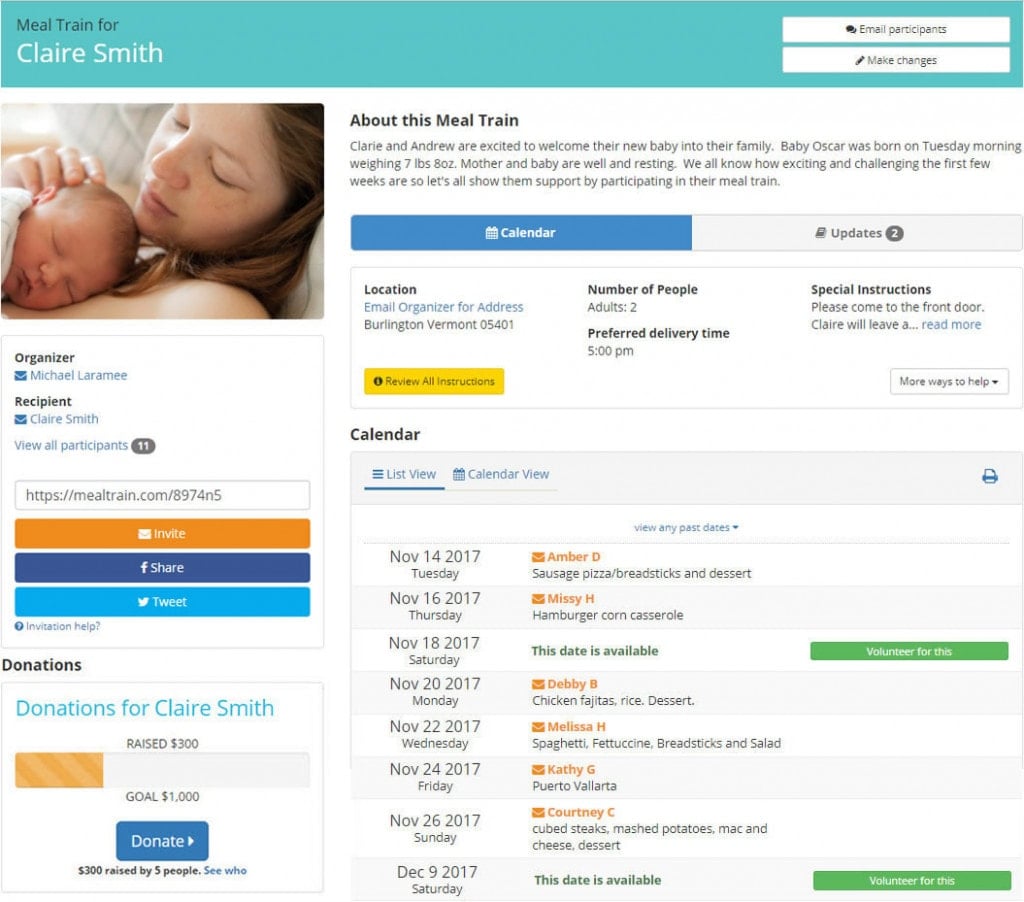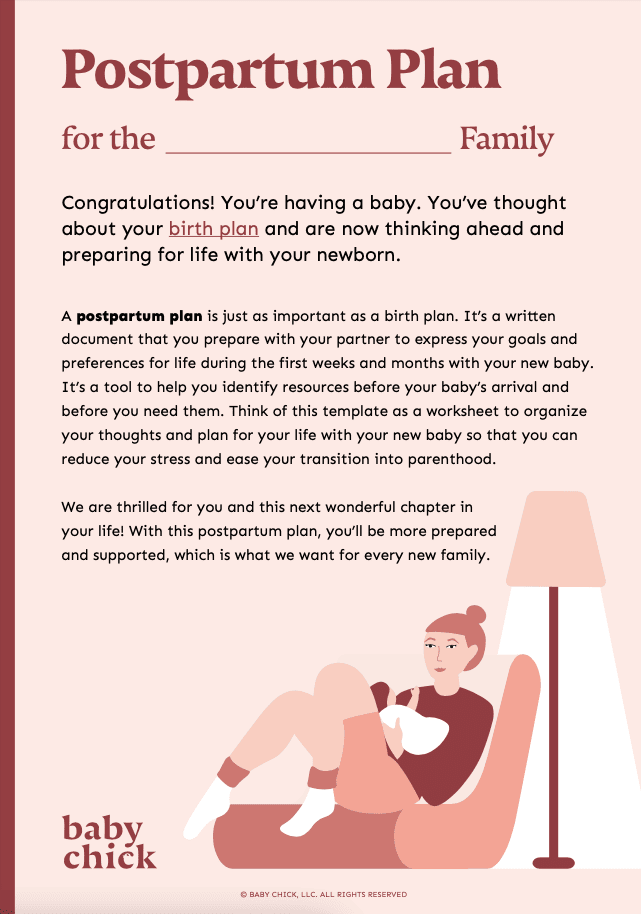When a couple becomes engaged, it’s normal to spend months planning every detail of their big day. A wedding is a special event, but what matters most is the marriage that follows. The same is true for new parents. As a doula, I’ve seen many families focus heavily on labor and birth, while the postpartum period (the early days of recovery and parenting) often gets overlooked.
But the truth is, the postpartum phase is just as important as the birth itself. It sets the tone for your healing, your relationship, and your baby’s transition into the world. That’s why I’m passionate about helping parents create a postpartum plan—and not just any plan, but one tailored to your real needs.

In this article, I’ll explain how to make a postpartum plan, what to include, and why it matters. I’ve also included a free postpartum plan template to help you feel prepared and supported.
Writing a Postpartum Plan
A postpartum plan is a written document you prepare with your partner to express your goals and preferences for life during the first weeks and months with your new baby. This document can contain information about visitors, meal preparation and chores, postpartum self-care, childcare responsibilities, and more. You can also consult with a postpartum doula when creating your postpartum plan. After making your first draft, ask her if there is anything else that you might want to include that you hadn’t thought of.
Don’t take the word “plan” too literally.
Before you begin your postpartum plan, I’d like to mention that you must remain flexible. Just like you will need to be flexible with your birth plan, you will also need to be flexible with your postpartum plan. Even if things go exactly as planned and expected, writing one is still a good idea. The reason is that it’s a designated place to organize your wishes and makes you think about things you might not have thought of before. However, more than likely, something will come up that you did not expect or prepare for. For example, if your baby cannot latch properly while breastfeeding, if you (the new mom) experience postpartum anxiety or postpartum depression, or if the baby needs to go to the NICU.
It’s good to know your options and know that there is help. Writing a postpartum plan educates you on your options and what’s available in your area, ultimately making you a more prepared and empowered parent. I think it’s always a good idea to have a team, structures, and resources in place if things don’t go “as planned.”
What to Include in Your Postpartum Plan
1. Parental Leave
The first thing you must plan together as a family is who will stay home with the baby and how long. If you both work outside of your home, talk to your HR department to learn about your maternity leave or parental leave. Talk to your coworkers to ensure that everything is handled while you’re away so you are not bothered during this time. I cannot stress this enough: parental leave is not a vacation! This is a sacred time that you need to heal and learn about your baby. It’s also the time for your baby to learn about you.
To all the dads: You will never get this time back with your family. Your partner and baby need you now more than ever. Don’t let your coworkers make you feel guilty or “weak” for taking time away to be with your newborn. This is when you need to bond and learn how to parent this new child together. Ask if you have paternity leave and push for as much time off as possible. You will never regret it. Many dads usually try to take two weeks off — using any parental leave they have plus vacation time if they must — to bond with mother and baby. If you have more time than that, take it!
Helpful resources for new dads:
- Best Ways Dads Can Help a New Mom
- 13 Ways Dads Can Be Involved in Baby Care
- 13 Ways Dads Can Help With Breastfeeding
- Postpartum Depression in Men: Is It a Thing?
2. Visitors
Everyone is so excited to meet your new little one! But visitors can take a real toll on you both. First, talk about whether you want any visitors to the hospital. Then, talk about when you feel comfortable having visitors meet the new baby and how many you want per day. Some families are comfortable with one or two; others only want one visitor every other day. It all depends on how you feel and what you are most comfortable with.
Another thing you need to discuss is how long you want your houseguests to stay. 30 minutes? An hour? Several hours? There is no right or wrong answer. You may also change your mind on this length after your newborn arrives, which is okay! Make sure you both are on the same page and create a code word or phrase to remind your partner that it’s time for your visitors to go if they are lingering too long.
There is also no shame in asking for help from your visitors. Think of a list of things they can do that you would love their help with, and keep that list pinned to your fridge. Some ideas are emptying the dishwasher, holding the baby as mom goes to take a shower, running some errands for you on their way over, spending some solo time with your older children, etc. (Here’s a helpful list to share with friends and family: 15 Things You Should Do for a New Mom). Real friends that matter don’t mind helping, and friends that mind shouldn’t matter.
3. Parenting Roles
I find that soon-to-be parents don’t talk enough about parenting roles. You may have certain expectations from your partner as a parent. Maybe you expect him to get up with you in the middle of the night to help with the baby. Perhaps you expect him to prepare the meals for the family for the first two weeks. He might expect you to exclusively breastfeed or do all childrearing responsibilities. You must talk about your parenting roles and share what you both think your parenting roles should be.
It’s common for people to assume that what their parents did growing up is what every family should do. But every family is different, and all of our circumstances are unique. Discuss who will help with changing the diapers, feeding the baby, bathing the baby, burping the baby, getting groceries, housekeeping, taking care of the bills and finances, etc. You will both feel better knowing what you can do to help your family during this significant family milestone.
4. Rest & Sleep
As soon as you welcome your baby into the world, your life will morph into your baby’s schedule. This consists of a lot of sleeping, feeding, and pooping. Newborns require constant love and attention, often at night, and it can become exhausting for any parent every morning, noon, and night. This is why you need to consider who can help you during the first few weeks with the baby.
- Who can help you in the morning time?
- Who can help you in the afternoons/evenings?
- And who can help you overnight?
- Can anyone “move in” for a week or two for extra support?
Write a list of people who can help, including what days and times they are available. They can be family members, friends, doulas, neighbors, members of your religious and/or community groups, etc. Try to line up this help beforehand so you don’t have to fuss with it after your baby arrives.
5. Food & Hydration
With baby requiring so much of your time and attention, even taking care of your basic needs, like showering, eating, and drinking, can become challenging. It may not seem like much, but holding, feeding, burping, changing, rocking, shushing, bathing, and swaddling leave little time for anything else.
Before your baby arrives, think of meals you can prepare beforehand and store in your freezer. This will allow you to have some delicious and nutritious meals ready within minutes. You can do this by preparing a menu or “double batching” when cooking your weekly meals. Also, consider restaurants with delivery and take-out and grocery stores with delivery or curbside pick-up. You can also create a Meal Train and ask your family members, friends, etc., to bring you meals after your baby’s arrival. List any diet restrictions, food allergies, or food preferences when setting up your Meal Train.

6. Breastfeeding/ Bottle-Feeding Support
The first few weeks of learning how to feed your baby can feel neverending. It’s when you and baby figure out what works best for you — breastfeeding, bottle-feeding, formula, pumping, or all of the above. None have to be exclusive, and you can do a combination of them all (Read: How to Combination Feed: Supplementing Breast Milk With Formula). It’s all about doing what works best for you and your child. One day, one method may work, and another day, you may re-evaluate and choose something different. Every baby is different, and each situation is unique. It’s all about listening to your gut and heart.
Breastfeeding
If you choose to breastfeed your baby, wonderful! It’s essential to surround yourself with knowledgeable people about breastfeeding and who are also supportive of your choice. Breastfeeding is a learned skill that doesn’t always come naturally. It’s something that you and baby both have to figure out. Along the way, you may experience engorgement, sore or cracked nipples, mastitis, a clogged milk duct, low milk supply, and more. Having a list of people or professionals who can help you can make the learning curve much more manageable.
Bottle-feeding
If you choose to bottle-feed your baby, that’s also wonderful! Bottle-feeding is another learned skill that can also require a lot of trial and error. You must decide which formula is best for your baby, the right bottle and nipple, the best holding positions, how much to feed your baby, how to collect, store, and prepare expressed breast milk, how often to pump, and more.
For your postpartum plan, think about people who:
- will support and encourage your infant feeding choices: friends or relatives
- are supportive, informed, and up-to-date about infant feeding choices: doctors, midwife, pediatrician, lactation consultants, and doulas
Resources
Also, make a list of local breastfeeding specialists who can visit you, or you can go to them to help with infant feeding. Some great resources are:
7. Sibling Support
If this is not your first baby, make a plan for your older children. Who will stay with your older kids when you go into labor? I recommend having a few people on standby since they are basically on-call day or night to come over and help. You don’t want someone to fall through and be the only person you were counting on.
Think about who can help you with your older children when you bring the baby home. Who will entertain them, make sure their meals are prepared, take them to school, etc.? Of course, you will want to do some of the activities yourself. However, you will need help since you will also be caring for a newborn. Write a list of people familiar with your older child or children, or find a doula who can come over while you are in labor. Whoever you choose, write out your child’s routine and any needs they may have. There will be so much change for the older siblings. Having them stay in their routine will provide familiarity, consistency, and a better transition for the whole family.
8. Pet Care
You don’t want to forget about your fur babies! Think ahead about who could come over and walk your dogs, feed them, let them out if they need to go outside to potty, give them their medications if they are on any, etc. This can be a friend, family member, neighbor, dog walker, or pet sitter. It is also good to schedule some dog walking the first few weeks you are home so your pups also get some fresh air and exert some energy.
If a friend or family member will help with your pets, giving them a blanket that the new baby has slept on is a great idea. They can let your pets smell it and become familiar with the baby’s smell before you come home with baby. (Read more: How to Introduce Your Pets to Your Baby)
9. Mommy and Daddy Time/ Me Time
While connecting as a family with the new baby is wonderful, it’s also important to have some alone time. Whether you spend that time alone or alone together — just you and your partner — it will give you the mental break and connection you both need. Think about what calms you and what brings you joy. What makes you laugh? What do you enjoy doing that re-energizes and refuels you? Have your partner create a list as well. And think of a list of activities that you can do together. It can even be as simple as enjoying a sweet treat on the couch while watching a movie together before bed. Make your lists, and then think about how to make those things happen for both of you.
To make it possible, write out a list of people and their contact information who can provide occasional childcare or help with the baby. This could be friends, family, and professional childcare providers.
10. Community Support
Now that you are bringing a baby into the world, you’ll want to make friends with people who also have children. They will understand the busy schedules and sleepless nights and normalize much of what you experience. These could be neighbors, friends, or coworkers that you already know, or they could be people in a local mom’s group that you have never met before. Maybe you connected with one or two couples in parenting or childbirth classes. Write a list of people who have young babies or groups you could join to build your mom tribe and support network. It’s wonderful to feel like you’re not alone in going through the challenges and triumphs of parenthood. No one understands more than another new parent.
11. Mental Health Support
Mental health support is something that many expecting parents don’t think about — or don’t want to think about when preparing their postpartum plan. Perinatal mood and anxiety disorders (PMADs) affect 20-25% of pregnant people and new parents.1 This is why having resources and a list of local mental health care professionals with expertise in PMADs is important. Fortunately, perinatal and postpartum mood disorders can be treated. Treatment can include postpartum self-care, social support, talk therapy, and medication when needed, depending on the severity.
Many people don’t know that fathers can also experience postpartum depression. This is why your list should also contain online and local resources that can help you both during these times. Some great ones are:
12. Returning to Work
When you and/or your partner return to work, talk about what that transition will be like. Is it possible to ease in with a few days a week initially? It can be difficult for parents to leave their babies 5 days a week for work hours after spending weeks with their little ones at home. Some couples also stagger their parental leaves, giving more extended coverage before needing to find a daycare or nanny. Talk about your plan for when you or your partner goes back. Think about:
- Childcare options: daycare, babysitters, nannies
- Housekeeping and other chores
- What are your greatest concerns when returning to work?
- What are your partner’s concerns when returning to work?
Preparing for life with a newborn is one of the most important steps you can take as a parent. A personalized postpartum plan helps you feel more confident, supported, and ready for the emotional and physical changes ahead.
Download my free postpartum plan template to help you feel prepared and supported during your transition into parenthood. A little planning goes a long way toward clarity, calm, and confidence.
Free Postpartum Plan Template (Printable Download)
I’ve created a free, printable postpartum plan template to make planning easier for expecting and newly postpartum families. Print it out, sit down with your partner, and go through it together. It covers everything discussed in this article, so you can outline your plans, preferences, and support system, all in one organized place.
I hope it helps you feel more confident and prepared for life after birth!







